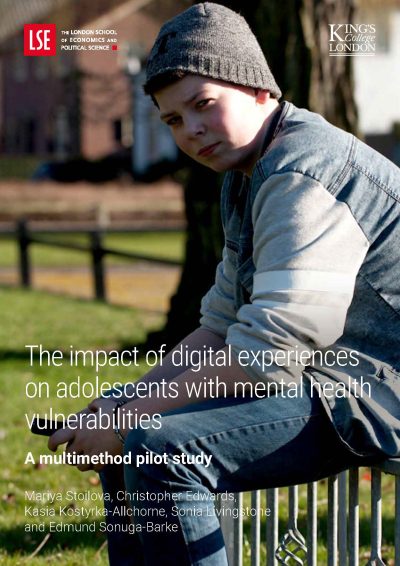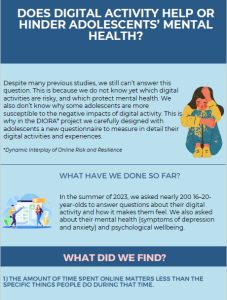Our researchers
Sonia Livingstone (LSE), Edmund Sonuga-Barke (KCL), Mariya Stoilova (LSE ), Peiyao Tang (QMUL), Jake Bourgaize (KCL), Kasia Kostyrka-Allchorne (QMUL), Aja Murray (University of Edinburgh)
Dynamic Interplay of Online Risk and Resilience in Adolescence (DIORA)
The DIORA (Dynamic Interplay of Online Risk and Resilience in Adolescence) project investigates how young people’s online activities shape their mental health and wellbeing,
Co-designed with adolescents, it uses innovative tools- the Digital Activity and Feelings Inventory (DAFI) and Managing My Life Online (MYLO)- to move beyond simplistic screen time metrics and to offer a richer understanding of what young people do online, how it makes them feel, how they actively manage digital risks and what the consequences are for their mental health and wellbeing.
The project draws on a pilot study with 383 adolescents and young adults aged 16-25, and a longitudinal study of 552 Year 9 students (age 13-14), surveyed three times over the course of one year. It also includes a qualitative strand involving focus groups with 110 children age 13-14, offering in-depth insights into their everyday digital experiences and strategies for coping online.
Key findings
Our research shows that young people's digital lives are deeply interwoven with their mental health and offline behaviours-in both positive and negative ways.
- What young people do online and how it makes them feel matters
- Associations between screen time and mental health are negligible and not significant once digital activities and emotional reactions are considered. It's not about how long children spend online but what they do and how it affects them.
- Social engagement such as chatting with family and friends and sharing posts, is the most common digital activity and is modestly associated with better wellbeing.
- Social comparisons, such as comparing appearance or popularity, are frequent and strongly associated with increased depression and lower wellbeing.
- Negative feelings about the self (for example, feeling judged, insecure, rejected) and feeling stressed are common, and strongly linked to poorer mental health.
- Conversely, positive feelings (for example feeling calm, supported, or loved) are also frequent and associated with lower depression and higher wellbeing.
- Importantly, feelings and thoughts evoked by online experiences predict mental health outcomes far more effectively than screen time alone.
2. Young people show agency in managing digital risks
- 78% of the young people in our study were worried about the impact of digital activity on their mental health, and 82% took at least one action to address this in the past two weeks.
- Actions included seeking positive content, avoiding harmful interactions, taking social media breaks, blocking or reporting others.
- These strategies were more common among those with higher anxiety symptoms or recent exposure to risky digital content, indicating that youth agency acts as a protective response.
- Notably, those who had both positive and negative experiences online were more likely to engage in risk management suggesting a nuanced, reflective relationship with digital media, not a passive one.
3. Social comparison is a strong correlate of depression and anxiety symptoms
- Young people who engage in more risky digital activities, including risky content, risky interactions and social comparison, tend to have higher depressive and anxiety symptoms.
- Social comparison is most strongly associated with depression and anxiety symptoms, after considering the influence of other digital, as well as non-digital activities. This was found both in younger (age 13-14) and older (age 16-25) adolescents.
- Engaging in more social comparison online predicts subsequent increases in depressive and anxiety symptoms in adolescents.
Together, these findings show that digital activities and their emotional impacts significantly shape mental health in young people. Risky digital activities, especially social comparison, are linked to higher symptoms of depression and anxiety. While risks are real, so too is the potential for support, connection and positive development online.
Crucially, we find that young people do not remain passive when exposed to online risks, but show substantial agency in actively managing their digital lives. Supporting this agency, improving digital literacy, and recognising emotional responses-rather than merely restricting screentime- are essential for promoting wellbeing in the digital age.
The popular media is full of claims about the way adolescents use the internet and how this impacts their mental health, seemingly backed up by research evidence. However, a lot of that evidence is cross-sectional in nature which means that we can’t say whether it is the internet use that drives mental health or mental health states that drive internet use. This makes sensible intervention to improve mental health impossible. DIORA will answer this vital question!
KCL
It is time to understand the role played by “digital engagement” in the emotional lives and mental health of adolescents, so that policymakers and practitioners can tailor their support effectively. Our project will pay close attention to the interplay between mood and digital activities among young people struggling with eating disorders and self-harm. Does going online help or hinder – and when and why? We aim to find out.
LSE
Project partners








